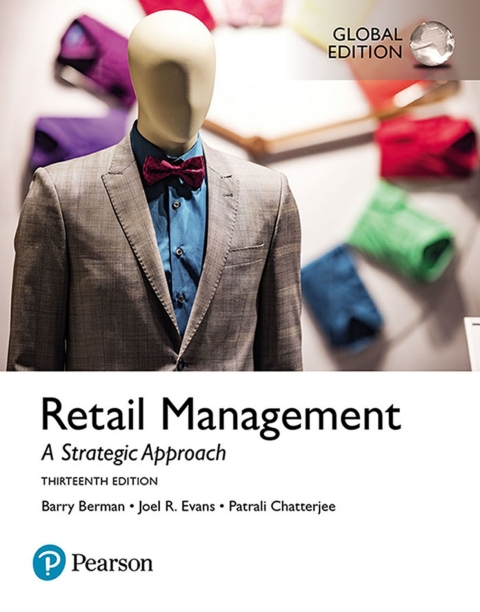Description
Efnisyfirlit
- Title Page
- Copyright Page
- Brief Contents
- Contents
- Preface
- PART 1 An Overview of Strategic Retail Management
- Chapter 1 An Introduction to Retailing
- Chapter Objectives
- Overview
- The Framework of Retailing
- Reasons for Studying Retailing
- The Special Characteristics of Retailing
- The Importance of Developing and Applying a Retail Strategy
- The Home Depot Corporation: Successfully Navigating the Omnichannel Landscape
- The Retailing Concept
- The Focus and Format of the Text
- Chapter Summary
- Key Terms
- Questions for Discussion
- Web-Based Exercise: blog (www.bermanevansretail.com)
- Appendix Understanding the Recent Economic Environment in the United States and Around the Globe
- The Current Economic Situation in the United States
- The Impact of the Downturn on Economies Around the World
- The Effect of the Current Economic Climate on Retailing
- Strategic Options for Retailers
- Chapter 2 Building and Sustaining Relationships in Retailing
- Chapter Objectives
- Overview
- Value and the Value Chain
- Retailer Relationships
- Customer Relationships
- Channel Relationships
- The Differences in Relationship Building Between Goods and Service Retailers
- Technology and Relationships in Retailing
- Electronic Banking
- Customer and Supplier Interactions
- Ethical Performance and Relationships in Retailing
- Ethics
- Social Responsibility
- Consumerism
- Chapter Summary
- Key Terms
- Question for Discussion
- Web-Based Exercise: Sephora (www.sephora.com)
- Appendix Planning for the Unique Aspects of Service Retailing
- Abilities Required to be a Successful Service Retailer
- Improving the Performance of Service Retailers
- The Strategy of Pal’s Sudden Service: Baldrige Award Winner
- Chapter 3 Strategic Planning in Retailing
- Chapter Objectives
- Overview
- Situation Analysis
- Organizational Mission
- Ownership and Management Alternatives
- Goods/Service Category
- Personal Abilities
- Financial Resources
- Time Demands
- Objectives
- Sales
- Profit
- Satisfaction of Publics
- Image (Positioning)
- Selection of Objectives
- Identification of Consumer Characteristics and Needs
- Overall Strategy
- Controllable Variables
- Uncontrollable Variables
- Integrating Overall Strategy
- Specific Activities
- Control
- Feedback
- A Strategic Planning Template For Retail Management
- Chapter Summary
- Key Terms
- Questions for Discussion
- Web-Based Exercise: Angie’s List (www.angieslist.com)
- Appendix The Special Dimensions of Strategic Planning in a Global Retailing Environment
- Opportunities and Threats in Global Retailing
- U.S. Retailers in Foreign Markets
- Foreign Retailers in the U.S. Market
- Part 1 Short Cases
- Case 1: Retailers MUST Be Future-Oriented
- Case 2: Stores That Accommodate Those with Physical Limitations
- Case 3: Is the Proliferation of Job Titles Helping or Hurting?
- Case 4: Competition and Quick Foodservice
- Part 1 Comprehensive Case
- Ideas Worth Stealing
- PART 2 Situation Analysis
- Chapter 4 Retail Institutions by Ownership
- Chapter Objectives
- Overview
- Retail Institutions Characterized by Ownership
- Independent
- Chain
- Franchising
- Leased Department
- Vertical Marketing System
- Consumer Cooperative
- Chapter Summary
- Key Terms
- Questions for Discussion
- Web-Based Exercise: 7-Eleven (www.franchise.7-eleven.com)
- Appendix The Dynamics of Franchising
- Managerial Issues in Franchising
- Franchisor–Franchisee Relationships
- Chapter 5 Retail Institutions by Store-Based Strategy Mix
- Chapter Objectives
- Overview
- Considerations in Planning a Retail Strategy Mix
- The Wheel of Retailing
- Scrambled Merchandising
- The Retail Life Cycle
- How Retail Institutions are Evolving
- Mergers, Diversification, and Downsizing
- Cost Containment and Value-Driven Retailing
- Retail Institutions Categorized By Store-Based Strategy Mix
- Food-Oriented Retailers
- General Merchandise Retailers
- Chapter Summary
- Key Terms
- Questions for Discussion
- Web-Based Exercise: Dillard’s (www.dillards.com)
- Chapter 6 Web, Nonstore-Based, and Other Forms of Nontraditional Retailing
- Chapter Objectives
- Overview
- Direct Marketing
- The Domain of Direct Marketing
- The Customer Database: Key to Successful Direct Marketing
- Emerging Trends
- The Steps in a Direct-Marketing Strategy
- Key Issues Facing Direct Marketers
- Direct Selling
- Vending Machines
- Electronic Retailing: The Emergence of the World Wide Web
- The Role of the Web
- The Scope of Web Retailing
- Characteristics of Web Users
- Factors to Consider in Planning Whether to Have a Web Site
- Mobile Apps Enabling Online Retailing
- Examples of Web Retailing in Action
- Other Nontraditional Forms of Retailing
- Video Kiosks
- Airport Retailing
- Chapter Summary
- Key Terms
- Questions for Discussion
- Web-Based Exercise: “Charts & Data” section of Internet Retailer’s Web site (www.internetretai
- Appendix Omnichannel Retailing
- Advantages of Omnichannel Retail Strategies
- Developing a Well-Integrated Omnichannel Strategy
- Special Challenges
- Part 2 Short Cases
- Case 1: Do Power Players Rule?
- Case 2: Will the Favorites of Today Remain Popular?
- Case 3: Omnichannel Strategies of Top Retailers
- Case 4: Omnichannel Food Retailing Still Needs Work
- Part 2 Comprehensive Case
- What Consumers Find Expendable versus Untouchable
- What Are Consumers Finding Expendable?
- Ongoing Recovery
- Mash-Up
- Older and Wiser?
- Tracking Trends
- Gender Trends
- PART 3 Targeting Customers and Gathering Information
- Chapter 7 Identifying and Understanding Consumers
- Chapter Objectives
- Overview
- Consumer Demographics and Lifestyles
- Consumer Demographics
- Consumer Lifestyles
- Retailing Implications of Consumer Demographics and Lifestyles
- Consumer Profiles
- Consumer Needs and Desires
- Shopping Attitudes and Behavior
- Attitudes toward Shopping
- Where People Shop
- The Consumer Decision Process
- Types of Consumer Decision Making
- Impulse Purchases and Customer Loyalty
- Retailer Actions
- Retailers with Mass Marketing Strategies
- Retailers with Concentrated Marketing Strategies
- Retailers with Differentiated Marketing Strategies
- Environmental Factors Affecting Consumers
- Chapter Summary
- Key Terms
- Questions for Discussion
- Web-Based Exercise: Claire’s (www.claires.com) and Icing (www.icing.com)
- Chapter 8 Information Gathering and Processing in Retailing
- Chapter Objectives
- Overview
- Information Flows in a Retail Distribution Channel
- Avoiding Retail Strategies Based on Inadequate Information
- The Retail Information System
- Building and Using a Retail Information System
- Database Management
- Gathering Information through the UPC and EDI
- The Marketing Research Process
- Secondary Data
- Primary Data
- Chapter Summary
- Key Terms
- Questions for Discussion
- Web-Based Exercise: Coca-Cola Retailing Research Council (www.ccrrc.org)
- Part 3 Short Cases
- Case 1: Eating Patterns in America
- Case 2: The Convenience Economy Comes of Age
- Case 3: Are Hot Retailers of 2015 Still Hot?
- Case 4: Navigating the Shopper Universe through Big Data
- Part 3 Comprehensive Case
- How Do You Attract and Satisfy Millennials?
- PART 4 Choosing a Store Location
- Chapter 9 Trading-Area Analysis
- Chapter Objectives
- Overview
- The Importance of Location to a Retailer
- Trading-Area Analysis
- The Use of Geographic Information Systems in Trading-Area Delineation and Analysis
- The Size and Shape of Trading Areas
- Delineating the Trading Area of an Existing Store
- Delineating the Trading Area of a New Store
- Characteristics of Trading Areas
- Characteristics of the Population
- The Nature of Competition and the Level of Saturation
- Chapter Summary
- Key Terms
- Questions for Discussion
- Web-Based Exercise: Web site of Site Selection Online (www.siteselection.com)
- Chapter 10 Site Selection
- Chapter Objectives
- Overview
- Types of Locations
- The Isolated Store
- The Unplanned Business District
- The Planned Shopping Center
- The Choice of a General Location
- Location and Site Evaluation
- Pedestrian Traffic
- Vehicular Traffic
- Parking Facilities
- Transportation
- Store Composition
- Specific Site
- Terms of Occupancy
- Overall Rating
- Chapter Summary
- Key Terms
- Questions for Discussion
- Web-Based Exercise: Main Street America (www.preservationnation.org/main-street)
- Part 4 Short Cases
- Case 1: Are Smaller and Faster Better?
- Case 2: Organize, Optimize, Synchronize
- Case 3: Removing Barriers to Cross-Border Commerce
- Case 4: Warehouse Management: Right Time, Right Place
- Part 4 Comprehensive Case
- PART 5 Managing a Retail Business
- Chapter 11 Retail Organization and Human Resource Management
- Chapter Objectives
- Overview
- Setting Up a Retail Organization
- Specifying Tasks to Be Performed
- Dividing Tasks among Channel Members and Customers
- Grouping Tasks into Jobs
- Classifying Jobs
- Developing an Organization Chart
- Organizational Patterns in Retailing
- Organizational Arrangements Used by Small Independent Retailers
- Organizational Arrangements Used by Department Stores
- Organizational Arrangements Used by Chain Retailers
- Organizational Arrangements Used by Diversified Retailers
- Human Resource Management in Retailing
- The Special Human Resource Environment of Retailing
- The Human Resource Management Process in Retailing
- Chapter Summary
- Key Terms
- Questions for Discussion
- Web-Based Exercise: Macy’s, Inc. has dedicated to “Careers After College” (www.macyscollege.co
- Chapter 12 Operations Management: Financial Dimensions
- Chapter Objectives
- Overview
- Profit Planning
- Asset Management
- The Strategic Profit Model
- Other Key Business Ratios
- Financial Trends in Retailing
- Budgeting
- Preliminary Budgeting Decisions
- Ongoing Budgeting Process
- Resource Allocation
- The Magnitude of Various Costs
- Productivity
- Chapter Summary
- Key Terms
- Questions for Discussion
- Web-Based Exercise: QuickBooks (http://quickbooks.intuit.com/tutorials)
- Chapter 13 Operations Management: Operational Dimensions
- Chapter Objectives
- Overview
- Operating a Retail Business
- Operations Blueprint
- Store Format, Size, and Space Allocation
- Personnel Utilization
- Store Maintenance, Energy Management, and Renovations
- Inventory Management
- Store Security
- Insurance
- Credit Management
- Technology and Computerization
- Outsourcing
- Crisis Management
- Chapter Summary
- Key Terms
- Questions for Discussion
- Web-Based Exercise: Pricer (www.pricer.com/en/Solutions)
- Part 5 Short Cases
- Case 1: Assistant Store Manager
- Case 2: Manager, Training and Development
- Case 3: Senior Manager of Digital Operations
- Case 4: Retail Shrinkage: A Significant Problem
- Part 5 Comprehensive Case
- Predicting Retail Trends
- Predictions of 2016 Retailing Trends
- PART 6 Merchandise Management and Pricing
- Chapter 14 Developing Merchandise Plans
- Chapter Objectives
- Overview
- Merchandising Philosophy
- Buying Organization Formats and Processes
- Level of Formality
- Degree of Centralization
- Organizational Breadth
- Personnel Resources
- Functions Performed
- Staffing
- Devising Merchandise Plans
- Forecasts
- Innovativeness
- Assortment
- Brands
- Timing
- Allocation
- Category Management
- What Manufacturers Think about Retailers
- What Retailers Think about Manufacturers
- Merchandising Software
- General Merchandise Planning Software
- Forecasting Software
- Innovativeness Software
- Assortment and Allocation Software
- Category Management Software
- Chapter Summary
- Key Terms
- Questions for Discussion
- Web-Based Exercise: TXT Retail Web site (http://-txtretail.txtgroup.com/solutions/assortment-plann
- Chapter 15 Implementing Merchandise Plans
- Chapter Objectives
- Overview
- Implementing Merchandise Plans
- Gathering Information
- Selecting and Interacting with Merchandise Sources
- Evaluating Merchandise
- Negotiating the Purchase
- Concluding Purchases
- Receiving and Stocking Merchandise
- Reordering Merchandise
- Re-evaluating on a Regular Basis
- Logistics
- Performance Goals
- Supply Chain Management
- Order Processing and Fulfillment
- Transportation and Warehousing
- Customer Transactions and Customer Service
- Inventory Management
- Retailer Tasks
- Inventory Levels
- Merchandise Security
- Reverse Logistics
- Inventory Analysis
- Chapter Summary
- Key Terms
- Questions for Discussion
- Web-Based Exercise: “Business” section of the U.S. Postal Service’s Web site (www.usps.com/bus
- Chapter 16 Financial Merchandise Management
- Chapter Objectives
- Overview
- Inventory Valuation: The Cost and Retail Methods of Accounting
- The Cost Method
- The Retail Method
- Merchandise Forecasting and Budgeting: Dollar Control
- Designating Control Units
- Sales Forecasting
- Inventory-Level Planning
- Reduction Planning
- Planning Purchases
- Planning Profit Margins
- Unit Control Systems
- Physical Inventory Systems
- Perpetual Inventory Systems
- Unit Control Systems in Practice
- Financial Inventory Control: Integrating Dollar and Unit Concepts
- Stock Turnover and Gross Margin Return on Investment
- When to Reorder
- How Much to Reorder
- Chapter Summary
- • Key Terms
- Questions for Discussion
- Web-Based Exercise: benchmarking section of the Retail Owners Institute Web site (http://retailowner
- Chapter 17 Pricing in Retailing
- Chapter Objectives
- Overview
- External Factors Affecting a Retail Price Strategy
- The Consumer and Retail Pricing
- The Government and Retail Pricing
- Manufacturers, Wholesalers, and Other Suppliers—and Retail Pricing
- Competition and Retail Pricing
- Developing a Retail Price Strategy
- Retail Objectives and Pricing
- Broad Price Policy
- Price Strategy
- Implementation of Price Strategy
- Price Adjustments
- Chapter Summary
- Key Terms
- Questions for Discussion
- Web-Based Exercise: Neiman Marcus (www.neimanmarcus.com)
- Part 6 Short Cases
- Case 1: Buyer of Sports Equipment
- Case 2: Adapting to the Internet of Things (IoT)
- Case 3: High Marks by Suppliers and Wholesalers for Convenience Stores
- Case 4: Data-Driven Pricing
- Part 6 Comprehensive Case
- Knocking Off the Knockoffs?
- PART 7 Communicating with the Customer
- Chapter 18 Establishing and Maintaining a Retail Image
- Chapter Objectives
- Overview
- The Significance of Retail Image
- Components of a Retail Image
- The Dynamics of Creating and Maintaining a Retail Image
- Atmosphere
- A Store-Based Retailing Perspective
- A Nonstore-Based Retailing Perspective
- Encouraging Customers to Spend More Time Shopping
- Community Relations
- Chapter Summary
- Key Terms
- Questions for Discussion
- Web-Based Exercise: Johnny Rockets (www.johnnyrockets.com)
- Chapter 19 Promotional Strategy
- Chapter Objectives
- Overview
- Elements of the Retail Promotional Mix
- Advertising
- Public Relations
- Personal Selling
- Sales Promotion
- Planning a Retail Promotional Strategy
- Determining Promotional Objectives
- Establishing an Overall Promotional Budget
- Selecting the Promotional Mix
- Implementing the Promotional Mix
- Reviewing and Revising the Promotional Plan
- Chapter Summary
- Key Terms
- Questions for Discussion
- Web-Based Exercise: Web site (www.entrepreneur.com/article/241607)
- Part 7 Short Cases
- Case 1: Keep It Simple
- Case 2: More than Price
- Case 3: Enhancing the In-Store Experience through Facial Recognition Software
- Case 4: Revitalizing Customer Loyalty
- Part 7 Comprehensive Case
- Inside the Mind of Shake Shack’s Founder
- PART 8 Putting It all Together
- Chapter 20 Integrating and Controlling the Retail Strategy
- Chapter Objectives
- Overview
- Integrating the Retail Strategy
- Planning Procedures and Opportunity Analysis
- Defining Productivity in a Manner Consistent with the Strategy
- Performance Measures
- Scenario Analysis
- Control: Using the Retail Audit
- Undertaking an Audit
- Responding to an Audit
- Possible Difficulties in Conducting a Retail Audit
- Illustrations of Retail Audit Forms
- Chapter Summary
- Key Terms
- Questions for Discussion
- Web-Based Exercise: American Customer Satisfaction Index (www.theacsi.org)
- Part 8 Short Cases
- Case 1: Envision the Future: Part 1
- Case 2: Envision the Future: Part 2
- Part 8 Comprehensive Case
- Achieving Excellence in Retailing
- Research Methodology
- Appendix: Careers in Retailing
- Glossary
- Endnotes
- Name Index
- Subject Index






Reviews
There are no reviews yet.